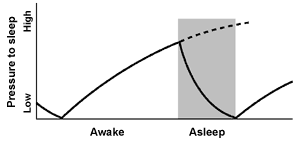Is fatigue the same as sleepiness? (how to tell the difference)
Is the person in this photograph fatigued or sleepy?
It is easy to make assumptions about others based on their appearance or behaviours but, do we also make assumptions about ourselves when we feel fatigued?
The first thought for most people experiencing fatigue is, “I must get some more sleep”.
However if you are already getting 7 – 8 hours reasonable sleep this is unlikely to make you feel better.
It may be helpful to try and differentiate between these 2 states. This then can inform any useful changes to your lifestyle that might be beneficial to support improved sleep or to access the right help if it’s a persistent issue.
“When we asked a group of clients if they could tell the difference between feeling fatigued and sleepy. They all were clear that there was a difference.”
They talked about the feeling of sleepiness being associated with the feeling of dropping off to sleep. This was considered a good feeling if felt at the right time i.e. when in bed at night. It was considered a difficult feeling to cope with or override during the day when being alert is more desirable.
There was a greater variance in descriptions of fatigue. However, in general it was described as an unpleasant feeling that impacted on the desire to be active.
The Oxford Dictionary offers us these definitions;
Fatigue – Extreme tiredness resulting from mental or physical exertion or illness
Sleepiness – The state of being sleepy.
Sleepiness
We read a lot about our internal body clock or Circadian rhythm. This does impact on our sleep wake balance throughout the day. As our natural level of melatonin builds up in the evening, we become less alert and sleep is more likely. However, melatonin does not actually trigger sleep
The feeling of sleepiness or pressure to sleep is, infact, the result of a chemical in the brain called adenosine. The level of adenosine builds up during the day and reaches its highest peak approximately 14 – 16 hours after waking. It is this high level of adenosine that triggers the onset of sleep.
The feeling of sleepiness is relieved by sleep itself, when the level of adenosine reduces again. If you get enough hours of normal quality sleep the desire for sleep should be almost fully diminished when we wake up and we should feel refreshed.
If we take a daytime sleep the level of adenosine will reduce and onset of sleep at night will be delayed.
The following diagram illustrates the increase in pressure to sleep as a result of increasing adenosine; the black line. This then decreases as we sleep.
Homeostatic Sleep Drive Black and Siobhan Banks
This means that the main action to take if you feel sleepy, is to stay awake all day to let the level of adenosine build up, then sleep for 7 – 8 hours.
If this last statement makes you feel anxious or frustrated as achieving this amount of sleep at night is only a distant memory, it may be worth accessing some specialist advice. Changing your sleep environment, reducing stimulants and reestablishing a good routine are all worth re-visiting. But if you are experiencing very disturbed sleep or are getting 8 hours at night and still experiencing daytime sleepiness you may need some extra help.
Fatigue
As the dictionary describes, fatigue is often described in relation to physical or mental exhaustion. This would seem reasonable if you have been overexerting yourself, for example, working long hours, running an event or overtraining. However, there maybe several factors which contribute to a less transient state of fatigue. Many of these may be related to lifestyle factors.
Take a look at the NHS self-help tips for beating fatigue and tiredness:
https://www.nhs.uk/live-well/sleep-and-tiredness/self-help-tips-to-fight-fatigue/
In conclusion we believe trying to describe and differentiate between sleepiness and fatigue is not just about semantics. Although a persistent lack of sleep will result in fatigue as well as sleepiness, addressing your sleep would seem to be the best form of action.. If, however, you are continuously fatigued, you may need to look at your sleep routine and habits and take a more general look at other potentially impacting lifestyle factors too. If these self-help measures seem impossible to implement or you are concerned your fatigue may be a sign of an underlying medical condition like Chronic Fatigue Syndrome/ ME, Thyroid disease or Diabetes we recommend that you seek expert advice.
Other related articles: https://vitality360.co.uk/blog/make-the-most-of-natural-light-in-winter
Written by the Vitalty360 specialist clinician team


